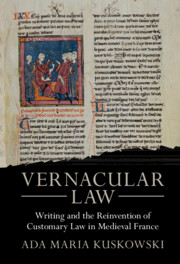‘This book is a marvel, mixing erudition and imagination. Describing the cultural upheaval of the writing of custom, Ada Kuskowski opens new doors to the understanding of medieval law.’
James Q. Whitman - Yale Law School
‘In the first comprehensive study of the earliest Northern French lawbooks known as coutumiers, influential myths about the rules and procedures of lay courts known as customary law are met with challenging scrutiny. Kuskowski compellingly argues that, with no prototype available, the coutumier authors imaginatively shaped a new form of learned and official law for lay jurisdiction and for a new audience of regional secular elites. Coutumiers were the paradigm-shifting achievement of expert legal minds who, in creating an idiom to think with and about custom, profoundly affected medieval legal culture.’
Brigitte M. Bedos-Rezak - New York University
‘This study is a revelation. Early French customary law emerges from it as the dynamic creation of sophisticated juridical thinkers, who worked not to record local traditions, but to shape and teach a distinct form of legal practice and thinking for secular courts across thirteenth-century France. By studying the first coutumiers as a coherent whole, with a focus on language and manuscripts and an eye toward recent scholarship in legal history generally, Kuskowski defines a subject every bit as complex, interesting, and influential as the medieval Roman and canon laws that overshadow it in the historiography.’
Adam Kosto - Columbia University
‘… Kuskowski offers a stimulating reflection that is sure to arouse interest in discussing its proposals. His book is an invitation for historians and jurists, heirs of continental law or common law forming ‘part of the same family’ (Tamar Herzog), to compare even more views on the history of the formation and evolution of legal systems.’
Florent Garnier
Source: Francia recensio
‘In Vernacular Law, the reader follows Kuskowski on her journey toward a painstakingly acquired cumulative understanding of the meaning(s) of custom and customary law in the coutumier literature and its historiography. It is a lengthy journey, with no singular grail at the end, but one which every legal historian wishing to understand the subject will henceforth be obliged (and, one hopes, delighted) to take … The book will serve as a resource for historians for decades to come.’
Elizabeth Papp Kamali
Source: Bulletin of Medieval Canon Law
‘Ada Kuskowski’s approach is fascinating because it forces us to take a step back, away from traditional historiographical categories and towards a decompartmentalized vision of law, which mixes orality and writing, learned rights and customs, local singularities and procedural homogenization. With this solid and stimulating work, we are offered a magnificent source of food for thought.’
Corinne Leveleux
Source: La revue historique de droit français et étranger
‘Kuskowski presents an instructive view of the practice of early vernacular writing in all of its innovative and unstable freshness, while also offering a striking depiction of medieval legal culture as one of improvised negotiation effected through a bricolage of writing and orality, which transmitted but also invented tradition. The book will be of interest to book historians as well as to its primary audience of legal historians.’
Robert O. Steele
Source: Sharp News



